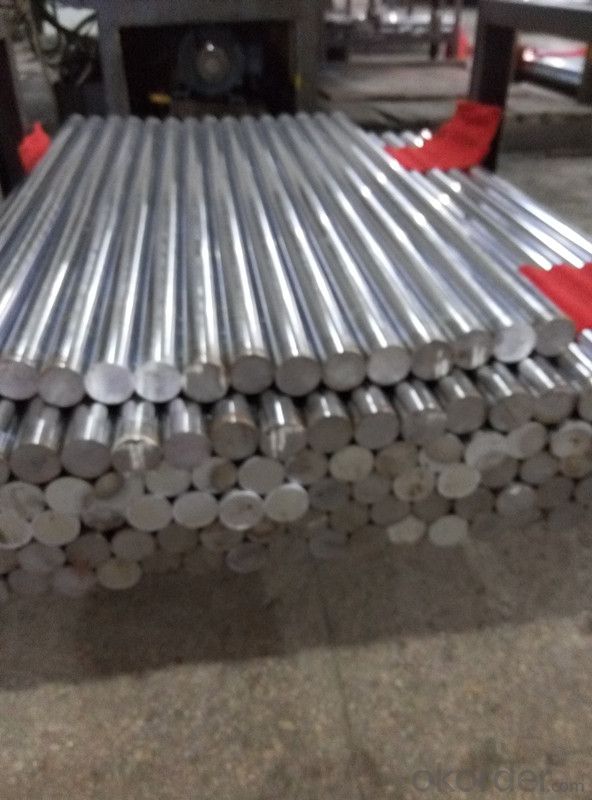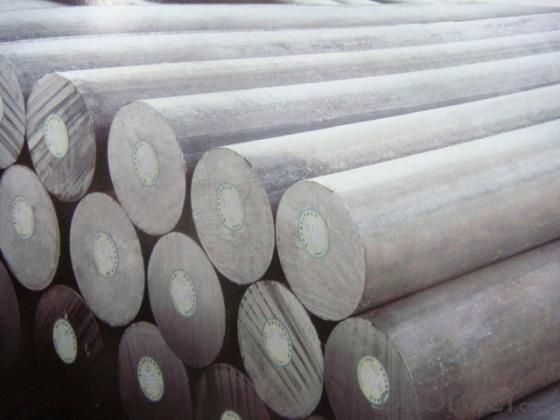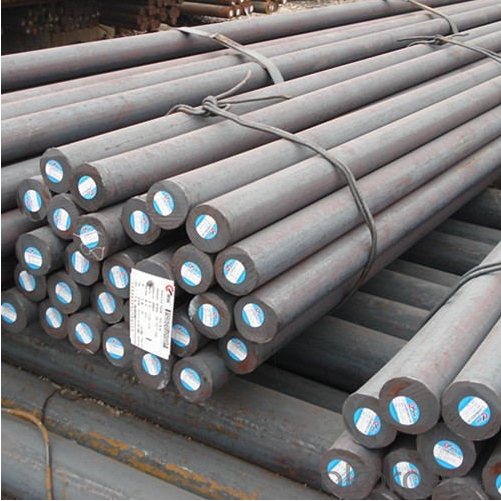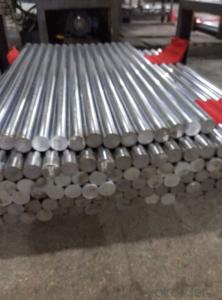Forged AISI 52100 Steel Hot Rolled Round Bar Steel
- Loading Port:
- Tianjin
- Payment Terms:
- TT OR LC
- Min Order Qty:
- 25 m.t.
- Supply Capability:
- 50000 m.t./month
OKorder Service Pledge
OKorder Financial Service
You Might Also Like
Item specifice
Forged AISI 52100 Steel Hot Rolled Round Bar Steel
Product Details:
1. AISI 52100/EN31/GCr 15/ DIN 1.3505/JIS SUJ2 bearing steel round bar
2.Hot rolled or forged condition, annealing , black or milled surface
3.Hardness: ≤210HBS ;
4 Hot rolled technology:EAF+LF+VD
Forged technology: EAF+LF+VD+ESR+Forging +Q T + Machined surface
5.Ultrasonic test standard: SPE1921-GR3, CLASS C/C
6.Production leadtime: 7~10 days
Chemical Composition:
C | Si | Mn | P | S | Cr | Mo |
0.95-1.05 | 0.15-0.35 | 0.25-0.45 | ≤0.025 | ≤0.025 | 1.4-1.65 | 0.1 max |
Advantage:
1)good comprehensive properties
2)good perfomance in cutting and processing after spheroids annealing
3)high hardness and homogrnization after quenching and tempering
4)high abrasive resistance and fatigue resistance
5)large amount of metal elements
6)Top quality
7)GCr15 is the most widely used bearing steel
Application:
Our products have been used in all kinds of areas, such as aviation,aerospace,navigation,nuclear energy,chemical
industry,electronic information,achine manufacture, petrochemical, automotive,instrument and meter, Communication ,
transportation, and medical instruments, etc.
Product Show:



- Q:Can special steel be used in the production of kitchen utensils?
- Kitchen utensils can benefit from the use of special steel. This term refers to steel alloys with specific properties, including resistance to corrosion, high strength, and durability. These qualities make special steel suitable for various applications, including the production of kitchen utensils. To meet the demands of regular use, exposure to water, and high temperatures, kitchen utensils require a robust material. Special steel, such as stainless steel, is commonly used for this purpose due to its resistance to corrosion and ability to withstand heat. Stainless steel utensils are widely recognized for their durability, rust resistance, and ease of cleaning. Apart from stainless steel, there are other types of special steel suitable for kitchen utensils. For instance, high carbon steel is often employed in the production of chef knives due to its sharpness and strength retention. Additionally, titanium-coated steel utensils are available, offering benefits like non-stick properties and enhanced durability. In conclusion, special steel provides versatility in the production of various kitchen utensils. Its outstanding properties make it an ideal choice for manufacturers aiming to deliver durable and high-quality products capable of enduring the demands of everyday kitchen use.
- Q:How does special steel contribute to the mining industry?
- Special steel contributes to the mining industry by offering enhanced durability, high strength, and resistance to extreme conditions. It is used in various mining equipment and machinery, such as drills, excavators, and crushers, to withstand the harsh environment and increase efficiency. Additionally, special steel alloys with specific properties are utilized in mining processes like ore extraction and mineral processing, ensuring optimum performance and reducing downtime.
- Q:How does special steel perform in terms of wear resistance in abrasive environments?
- Special steel is renowned for its remarkable ability to resist wear in environments with abrasives. The unique combination of elements and the specific heat treatment methods employed during its production result in a greater level of hardness compared to regular steels. This enhanced hardness grants special steel exceptional resistance to wear caused by abrasive particles or surfaces. In environments where friction and contact with hard materials are prevalent, special steel demonstrates outstanding performance. It can endure the erosive effects of abrasive particles, such as sand, rocks, or metal fragments, without experiencing significant wear or damage. This durability positions special steel as the ideal choice for various applications, including mining equipment, cutting tools, industrial machinery, and automotive components. Furthermore, the wear resistance of special steel extends beyond its surface, permeating throughout its structure. Consequently, even if the steel's surface becomes scratched or abraded, the underlying material remains highly resistant to wear. This characteristic ensures that components made from special steel enjoy an extended lifespan, thereby reducing maintenance costs and downtime. Moreover, special steel retains its wear resistance even when subjected to high temperatures. This property proves particularly advantageous in abrasive environments where the heat generated by friction can accelerate wear. The ability of special steel to maintain its hardness and wear resistance at elevated temperatures guarantees its effectiveness in demanding applications such as high-speed machining or hot forging. Overall, special steel surpasses standard steels when it comes to wear resistance in abrasive environments. Its superior hardness, structural integrity, and temperature resistance make it an excellent choice for applications where durability and longevity are crucial.
- Q:What are the limitations of special steel?
- Some limitations of special steel include its high cost and limited availability, as well as the difficulty in shaping and processing it. Additionally, special steel may have lower tensile strength compared to other materials and can be prone to corrosion if not properly maintained.
- Q:How does special steel ensure product traceability?
- Special steel ensures product traceability through the implementation of unique identification codes, comprehensive record-keeping systems, and advanced tracking technologies. These measures enable manufacturers to accurately track and trace the entire lifecycle of the steel, from raw materials to the finished product. This ensures that any issues or defects can be identified and addressed promptly, enhancing quality control and customer satisfaction.
- Q:What are the emerging trends in special steel production?
- There are several emerging trends in special steel production that are shaping the industry. 1) Increasing demand for high-performance alloys: With advancements in technology and industrial applications, there is a growing need for special steels with superior properties like high strength, corrosion resistance, and heat resistance. This has led to a higher demand for special alloys such as stainless steel, tool steel, and superalloys. 2) Adoption of advanced manufacturing techniques: Special steel production is witnessing a shift towards advanced manufacturing techniques like additive manufacturing (3D printing) and precision machining. These techniques allow for the production of complex geometries and customized components, leading to improved efficiency and reduced material waste. 3) Focus on sustainability: The steel industry is increasingly adopting sustainable practices to reduce its environmental footprint. This includes the use of recycled materials, energy-efficient production processes, and waste management strategies. As a result, special steel producers are investing in cleaner technologies to meet the growing demand for sustainable steel products. 4) Industry 4.0 integration: The integration of digital technologies, automation, and data analytics is revolutionizing the special steel production process. Industry 4.0 solutions enable real-time monitoring, predictive maintenance, and optimization of production parameters, resulting in increased productivity, quality, and cost-effectiveness. 5) Development of new alloys for emerging industries: With the rise of new industries such as aerospace, renewable energy, and electric vehicles, special steel producers are developing innovative alloys to meet their specific requirements. For example, the development of lightweight, high-strength steels for aerospace applications or corrosion-resistant steels for offshore wind turbines. 6) Global collaborations and partnerships: Special steel producers are increasingly collaborating with research institutions, universities, and other industry players to drive innovation and share knowledge. These collaborations help in developing new steel grades, exploring new applications, and improving production processes. Overall, the emerging trends in special steel production revolve around meeting the demand for high-performance alloys, adopting advanced manufacturing techniques, focusing on sustainability, integrating Industry 4.0 technologies, developing alloys for emerging industries, and fostering collaborations. These trends are shaping the future of special steel production, creating opportunities for growth and innovation in the industry.
- Q:What are the different types of high-speed steel?
- There are several different types of high-speed steel, including M1, M2, M42, and T1. These variations have different compositions and properties, such as varying levels of tungsten, molybdenum, and vanadium, which affect their hardness, toughness, and heat resistance.
- Q:How long does special steel last compared to regular steel?
- Special steel generally lasts longer than regular steel due to its unique composition and properties. Regular steel is made mostly of iron and carbon, whereas special steel is alloyed with other elements such as chromium, nickel, and molybdenum to enhance its strength, hardness, and corrosion resistance. The lifespan of special steel depends on various factors such as the specific type of steel, its usage conditions, and maintenance. However, in general, special steel can have a significantly longer lifespan compared to regular steel. It is more resistant to wear and tear, corrosion, and high temperatures, making it suitable for demanding applications and environments. For instance, in industries such as aerospace, automotive, and construction, special steel is widely used for critical components like engine parts, structural elements, and cutting tools. These components often experience high stress, friction, and exposure to harsh conditions. Special steel's superior properties enable it to withstand these challenges and maintain its performance over a longer period of time. Moreover, special steel is often subjected to rigorous testing and quality control measures during its manufacturing process. This ensures that it meets specific industry standards and can endure extreme conditions without significant degradation. Regular steel, on the other hand, may not possess the same level of durability or longevity. In summary, while the exact lifespan of special steel compared to regular steel can vary depending on various factors, special steel generally lasts longer due to its enhanced properties and resistance to wear, corrosion, and high temperatures.
- Q:Can special steel be used in power generation applications?
- Indeed, power generation applications can certainly benefit from the utilization of special steel. When we mention special steel, we are referring to a diverse range of steel types that have been specifically engineered to possess superior attributes like high strength, durability, heat resistance, corrosion resistance, and wear resistance. These exceptional properties make special steel an ideal choice for power generation applications where the materials must endure elevated temperatures, pressures, and mechanical strains. Within the realm of power generation, various components and equipment can make use of special steel. Examples include turbine blades, boiler tubes, heat exchangers, steam pipes, and high-pressure valves. To illustrate, thermal power plants, which rely on fossil fuels for electricity generation, often employ special steel in boiler tubes and heat exchangers to withstand the demanding conditions of steam generation, characterized by high temperatures and pressures. Moreover, in the context of nuclear power plants, special steel finds application in critical components such as reactor vessels, steam generators, and fuel cladding. This is due to its exceptional strength, resistance to radiation damage, and resistance to corrosion. Furthermore, the use of special steel extends to renewable energy power generation applications. For instance, in wind turbines, special steel is employed in the construction of turbine towers, rotor blades, and gearboxes. Its purpose is to withstand the challenges of high wind speeds, vibrations, and fatigue. In summary, special steel occupies a vital role in power generation applications, thanks to its extraordinary properties. By ensuring the reliability, efficiency, and longevity of the equipment and components employed in diverse power generation systems, special steel contributes significantly to the field.
- Q:How does special steel contribute to the construction industry?
- Special steel contributes to the construction industry by providing high-strength and durable materials that are essential for building structures that can withstand extreme conditions, such as earthquakes, high winds, and heavy loads. Its unique properties, such as corrosion resistance, heat resistance, and ability to be molded into various shapes, enable the construction of safer and more efficient buildings, bridges, and other infrastructure projects. Additionally, special steel offers cost-effective solutions by reducing the need for maintenance and repairs, thus extending the lifespan of structures and ensuring long-term sustainability in the construction industry.
1. Manufacturer Overview |
|
|---|---|
| Location | |
| Year Established | |
| Annual Output Value | |
| Main Markets | |
| Company Certifications | |
2. Manufacturer Certificates |
|
|---|---|
| a) Certification Name | |
| Range | |
| Reference | |
| Validity Period | |
3. Manufacturer Capability |
|
|---|---|
| a)Trade Capacity | |
| Nearest Port | |
| Export Percentage | |
| No.of Employees in Trade Department | |
| Language Spoken: | |
| b)Factory Information | |
| Factory Size: | |
| No. of Production Lines | |
| Contract Manufacturing | |
| Product Price Range | |
Send your message to us
Forged AISI 52100 Steel Hot Rolled Round Bar Steel
- Loading Port:
- Tianjin
- Payment Terms:
- TT OR LC
- Min Order Qty:
- 25 m.t.
- Supply Capability:
- 50000 m.t./month
OKorder Service Pledge
OKorder Financial Service
Similar products
New products
Hot products
Related keywords






























